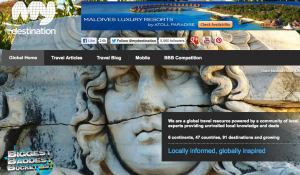Massimo Giovanardi
In Loco

Over the last couple of years, we are witnessing a rapidly increasing number of companies and start-up businesses at the intersection between technology and tourism. Of course, the Internet and mobile technologies have a great potential in terms of providing new ways to access tourism and destinations. For example, Wi-fi, wide touch screens, smartphones and tablets allow user to collect and exchange information before, during and after their consumption experience. In last month’s entry on my blog Inloco I sought to dig into a very fascinating project called “My Destination”.
“My Destination” is a good example of this new generation of businesses. What is it about? It is an online platform where people are supposed to find first-hand information about a certain destination. As its creators put it, we live in “a post-Lonely Planet era” where “people want the information live, they want it up to date, they want it current”. In order to address this pressing need, MyDestination relies on several teams of local people in every destination covered by the service. Each local team is affiliated as a franchisee and is supposed to own and operate local websites that provide travel advice and information to potential visitors, while giving local business owners a chance to advertise their businesses on the online platform.
The most fascinating feature lies in the franchising business model. An idea which is in line with a two-fold purpose: having “natives” providing fresh information about what’s going on in their tourism place; and building an efficient and profitable business model for the company. I believe that these two aims are not easy to fulfil simultaneously. The sponsored attractions may appear right below what are supposed to be tips from natives, thus potentially hampering the credibility of the “unrivalled local knowledge” which is said to be offered.
If you select “Italy”, just Florence is listed as a featured destination. Regarding Germany, no destinations at all yet. Thus, Berlin is not on the list. Why are these key destinations missing? For a relatively brand-new tourist site, this could be a shame, as first-time users like myself may be disappointed. The absence of big destinations is linked to the characteristics of the business model: the practice of franchising. Evidently, no franchisees have been found in these well-known cities yet.
Let’s give a cursory glance at the information pack or FIM, Franchise Information Memorandum. Not on the MyDestination website, because the information is available only on request. We can use http://www.theukfranchisedirectory.net/page/my-destination/eoejls.php where we discover that the initial investment is “only” 20.000 £ + VAT. Quite demanding for an activity that does not require to rent an office, as you are told that you can easily “work from home”. It s true that the company has been able to expand across many countries. But now I think that the franchising package should be revised if MyDestination intends to win the key destination whose absence clearly affect the trustworthiness of the entire project.
